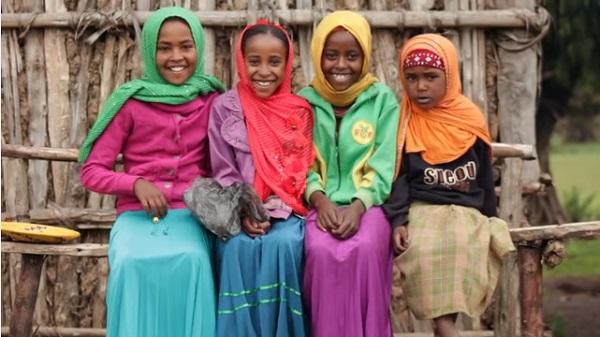
According to this report, Ethiopia is one of the ten countries, all except one in Africa, where gender disparity in primary education is very high.
By Clea Guy-Allen (ONE)
Educating girls can change the world.
Girls who get a complete, quality education are more likely to be healthier and better prepared to enter and succeed in the workforce. Education can give girls more opportunities to advocate for their own rights, contribute to their families and communities, and grow local and global economies.
But over 130 million girls didn’t go to school today. Millions more braved long distances, often in dangerous conditions, to get there. Other girls arrived at school to sit in a classroom where a teacher never arrived, or where there were no textbooks or other materials that help students learn. Because of this, in 2017, nearly half a billion women worldwide still cannot read.
To make sure every girl has the chance to get a good education, we need to understand where girls are being left behind. That’s why we’ve created the Toughest Places for a Girl to Get an Education index.
According to this report, Ethiopia is one of these ten countries, all except one in Africa, where gender disparity in primary education is very high; that is, girls face a wide range of obstacles and social barriers which impedes them from getting education. Ethiopia ranked 10th, whereas South Sudan ranked 1st (which is the worst).
In Ethiopia, 2 in every 5 girls are married before their 18th birthday, and nearly 1 in 5 marries before age 15.
There are dire consequences to not educating girls. In many countries, girls out of school will be more likely to become child brides, more vulnerable to diseases like HIV, and more likely to die young. For example, if current trends in education continue, by 2050, this is the future we’re looking at: Low-income countries alone will lose $1.8 trillion; the number of lives lost each year because of a failure to provide adequate access to quality education will equal those lost today to HIV and AIDS and malaria, some of the most deadly global diseases; and almost 950 million women will have been married as children, up from more than 700 million today.
This (gender disparity in education) is a global crisis, and we need to make sure world leaders are paying attention. That’s why we want you to add your voice to the chorus of those calling for funding for girls’ education.
Read the complete ranking at ONE
——
See also:
- Tizita: Baking a Sweet Future for Girls – CFTC
- Combating Gender-based Violence in Ethiopia
- VIDEO: Ethiopian Girls Become Heroes of Their Own Story
- VIDEO: UNICEF Ethiopia: Let Us All Stand to Empower Women and Girls
- The Yellow Movement: Ethiopian Women Use Valentine’s Day to Promote Girl Power
